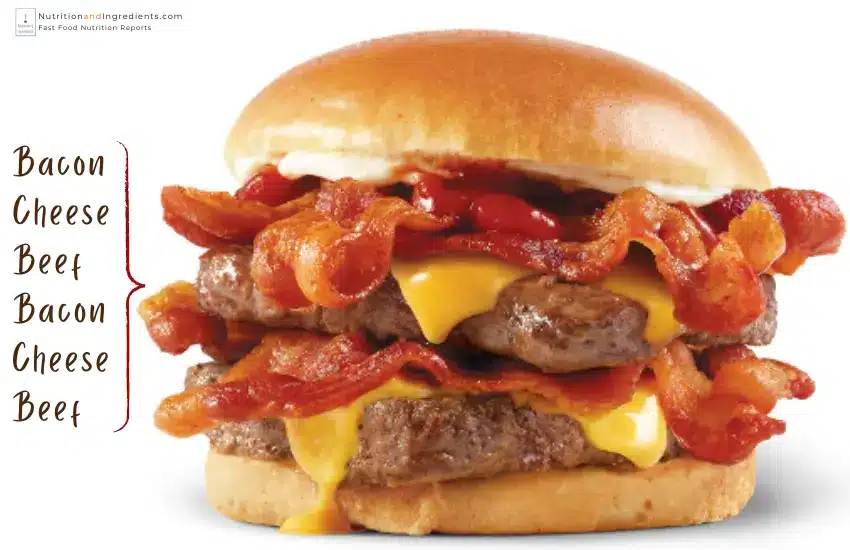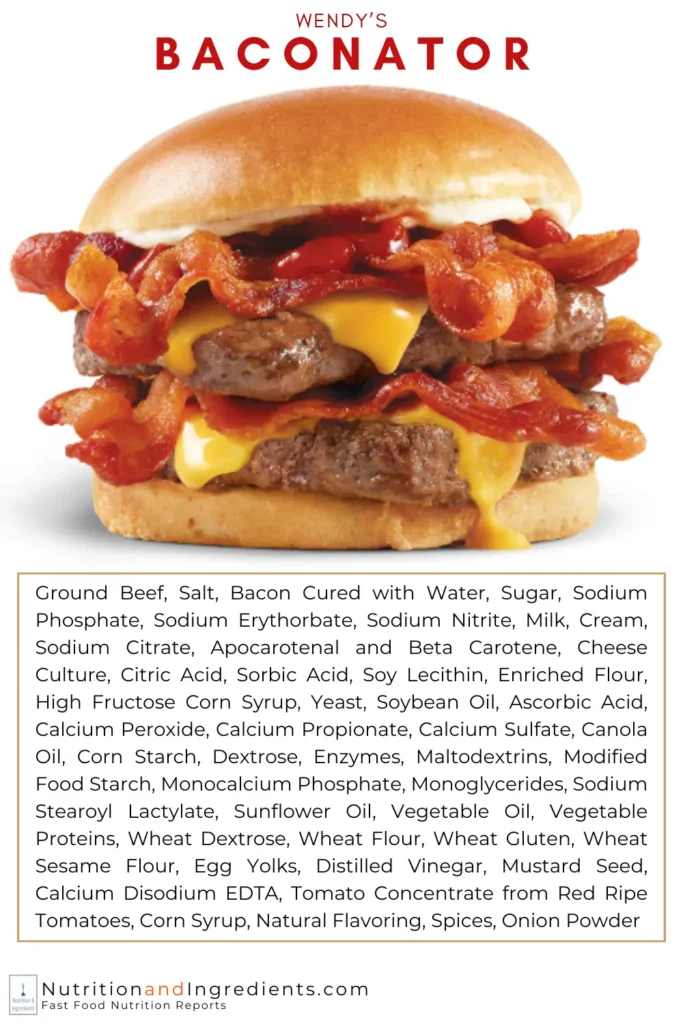Wendy’s Baconator Cheeseburger

Wendy’s Baconator cheeseburger combines 1/2 pound of fresh beef with American cheese and six pieces of Applewood smoked bacon. A standard serving is topped with ketchup and mayonnaise.
There are 900 calories, 59 grams of fat, 34 grams of carbohydrates, and 57 grams of protein in one double-patty bacon burger.
Read this report for a complete overview of the nutritional information, ingredients, and allergens in Wendy’s Baconator cheeseburger.
Wendy’s Baconator Nutritional Information
Nutrition facts are based on standard formulations and recipe for a single serving of Wendy’s bacon cheeseburger.
Calories
There are 900 calories in Wendy’s Baconator.
Here is a summary of calories by macronutrient, per serving:
Nearly 60% of the total calories are derived from dietary fats. Carbohydrates deliver 16% of the total calories, and the remaining 26% is from protein.
Baconator
% calories from fat, carbs and proteinCalories by macronutrient are rounded estimates based on the nutrition facts information provided by Wendy’s. Calories will vary with additional toppings.
Time to Burn Calories
An average adult would need to run at a moderate pace for approximately 75 minutes to burn off the calories from Wendy’s bacon cheeseburger.
Here is a list of approximate times required to burn 900 calories, by type of exercise.
FITNESS TIME TO BURN 900 CALORIES
Estimate based on moderate level of activity by an adult with average BMI.
Nutrition Facts
Review the table below for nutrition facts in Wendy’s Baconator, a large double-patty cheeseburger with Applewood smoked bacon topped with ketchup and mayonnaise.
Baconator
Amount (%DV) per sandwich
Red indicates a high %DV.
|
Calories |
900 |
%DV |
|
Total Fat |
59g |
76% |
|
Saturated Fat |
24g |
120% |
|
Trans Fat |
2.5g | |
|
Cholesterol |
165mg |
55% |
|
Sodium |
1570mg |
68% |
|
Carbohydrates |
34g |
12% |
|
Dietary Fiber |
1g |
4% |
|
Total Sugars |
7g | |
|
Protein |
57g |
%DV based on a 2,000 calorie diet. Calorie needs vary and your %DV may be higher or lower. Provided for informational purposes only. Consult with your physician for dietary or healthcare advice.
Check nutrition facts in Wendy’s menu options.
Total Fat in Baconator
There are 59 grams of total fat, including 24 grams of saturated fat, and 2.5 grams of trans fatty acids. That is high on all counts.
The amount of saturated fat in one serving of this beef sandwich exceeds the 20 gram recommended limit for an entire day. Saturated fat has a 120% daily value.
Calculate Daily Value of Fat in Bacon Burger
To calculate %DV, divide the amount of a nutrient in one serving by the FDA-recommended daily limit.
|
per Burger |
Daily Limit* |
Daily Value | |
|
Total Fat |
59g |
78g |
76% |
|
Saturated Fat |
24g |
20g |
120% |
*Based on FDA general nutrition advice for an adult following 2,000 calorie daily diet.
Summary of Fat per Serving
Dietary Cholesterol is High
There are 165 milligrams of cholesterol in a Baconator from Wendy’s fast food restaurant. That is high.
It’s over half (55% DV) of the total limit (300mg) recommended by the FDA for an entire day.
High in Sodium
In addition, each serving of Wendy’s large bacon burger with cheese contains 1,570 milligrams of sodium, a 68% daily value.
If you’re craving a bacon cheeseburger, but prefer a smaller portion, try the Son of Baconator.

Daily Value (%DV) is based on a 2,000 calorie diet, the standard measure used by the FDA for general nutrition advice. Calorie needs vary. Your %DV may be higher or lower depending on height, weight, and physical activity.
Ingredients and Allergens in Baconator
Here are the ingredients in Wendy’s beef patty, bacon, hamburger bun, cheese, and condiments.
Ingredients
|
Beef Patty |
|
Ground Beef, Salt |
|
Applewood Smoked Bacon |
|
Bacon Cured with Water, Salt, Sugar, Sodium Phosphate, Sodium Erythorbate, Sodium Nitrite |
|
American Cheese |
|
Milk, Cream, Water, Sodium Citrate, Salt, Apocarotenal and Beta Carotene (color), Cheese Culture, Citric Acid, Enzymes, Sorbic Acid (preservative), Soy Lecithin |
|
Hamburger Bun |
|
Enriched Flour, Water, High Fructose Corn Syrup and/or Sugar, Yeast, Soybean Oil, Ascorbic Acid, (Vitamin C), Calcium Peroxide, Calcium Propionate, Calcium Sulfate, Canola Oil, Citric Acid, Corn Starch, Dextrose, Enzymes, Maltodextrins, Modified Food Starch, Monocalcium Phosphate, Monoglycerides, Salt, Sodium Stearoyl Lactylate (SSL), Starch, Sunflower Oil, Vegetable Oil, Vegetable Proteins (pea, potato, fava bean), Wheat Dextrose, Wheat Flour, Wheat Gluten, Wheat Maltodextrins, Sesame Flour |
|
Condiments |
Allergens
The two patty bacon cheeseburger is made with ingredients that include egg, milk, sesame, soy, and wheat.
Check list of allergens in Wendy’s menu items.

Nutrition facts, prices, and ingredients are based on available information as of the date of publication. Restaurants and food manufacturers may change recipes or formulations without notice. Check package labels and ask the product manufacturer or restaurant for the most up-to-date information. Unless otherwise stated, %DV is based on a 2,000 calorie diet. All reports and reviews published on this site are for informational purposes only. NutritionandIngredients.com does not provide healthcare advice or dietary recommendations. Always consult your licensed physician for any healthcare or dietary advice.
Nutrition facts, ingredients, allergens: Wendy’s official website. Baconator cheeseburger product image courtesy of The Wendy’s Company. Original design by Nutrition & Ingredients for fast food nutrition research reports.
